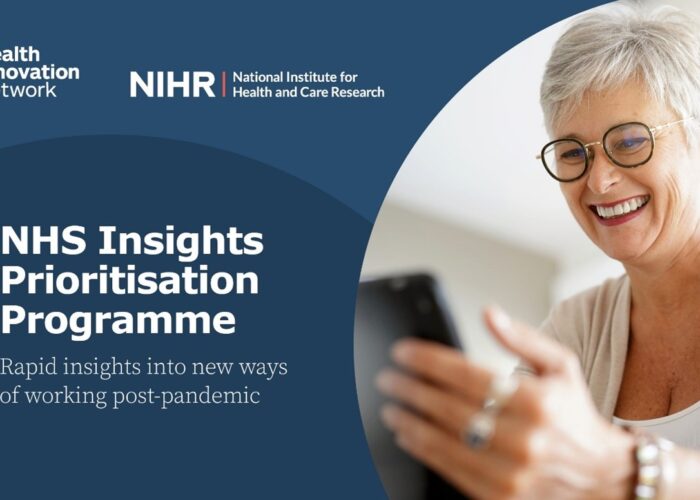On World Breastfeeding Awareness Week, Omid Nivi, Senior Innovation Manager, reflects on the work of the pan-London Maternity and Neonatal Services Safety Improvement Programme and working collaboratively with trusts to ensure that as many mothers who wish to breastfeed can.

For mothers who choose to, breastfeeding can offer a number of benefits – both for them and their baby.
From protecting babies against illness, improving long-term health outcomes and fulfilling their nutritional needs, to reducing risk of cardiovascular disease in mothers and the rates of readmission to hospital, breastfeeding can offer multiple health benefits. But it’s important that we offer women meaningful choice around breastfeeding – not all women can or want to breastfeed.
For those who wish to breast feed and then aren’t able to – perhaps due to being non-mobile while recovering from a caesarean section or being separated from their baby for any number of reasons – this can be a difficult time which can impact physical and mental health.
Being a father for the first time in December 2021, I saw firsthand how difficult it was to breastfeed, the logistics of my partner having had a C-section and not being mobile, and being in a department with patients who had COVID-19. Not really knowing how to do things and care for our baby was a learning curve but with the time, expertise and care given while in a maternity department we struggled through and were inspired. Working on the Pan London Maternity and Neonatal Services Safety Improvement Programme (MatNeoSIP) became very personal to me to improve where possible and deliver better healthcare and outcomes to both mothers and babies.
Over the last year, as part of NHS England’s MatNeoSIP, we’ve been working collaboratively with Nurses, Doctors, Breast feeding champions, Healthcare assistants, mothers with lived experiences and Midwives from across North West London. This ranged from in-person and hybrid working within maternity and neonatal across most of our North West London trusts, developing and delivering Quality Improvement projects focused on how we can improve experiences for mothers and babies in MatNeo units.
Where mothers may be separated from their babies, sometimes by wards on different floors, or where mothers may be non-mobile, the data showed us that in some cases this six-hour window was missed.
Access to service data is fundamental to improve services
New to my role at ICHP, and getting started on this project, we quickly realised that there was almost no data available for these MatNeo services. We were unable to see areas that may have been deteriorating and required improvement, as well as areas that were improving or excelling. We worked closely with the London Operational Delivery Network (ODN) and other senior stakeholders across London to get access to the data from these services. Ultimately, they produced a dashboard that now gives us and our NHS colleagues access to the quantitative insights from all trusts in NWL, as well as London as a whole. The impact of this cannot be overstated. The dashboard provides insight into areas of commonality for improvement, and areas of strength to share and spread.
The data gave us a clear picture of where to focus our efforts in NWL. Coupled with qualitative feedback from staff, we co-produced a plan to focus on maternal breast milk in two of our four trusts, Chelsea and Westminster and Hillingdon Hospitals, to focus on ensuring more pre-term babies get colostrum (first breast milk) in the first six hours whilst separated from their non-mobile mothers, which has long lasting health benefits compared to babies who do not.
Qualitative insight is key to understanding the challenge
And while the new MatNeo dashboard gave us invaluable quantitative insight, to truly understand the challenge it was vital to marry this with the experience and insight of our maternity and neonatal colleagues across the NWL NHS system. What were the barriers to mothers feeding their babies breastmilk in these settings?
As part of a Quality Improvement approach we undertook process mapping to understand the documented, ‘standardised’ process versus the reality of the day-to-day process that happens on the ward. The gaps identified were areas that could be improved relatively easily. Where mothers may be separated from their babies, sometimes by wards on different floors, or where mothers may be non-mobile, the data showed us that in some cases this six-hour window was missed.
Working collaboratively and developing solutions in this way helped to give common purpose, and improvements were seen relatively quickly through our workshop sessions.
Collaboration and patient voice
As well as working collaboratively with colleagues in the NHS, whose insight and knowledge was essential, we also wanted to ensure we had a patient voice woven into our analysis and worked closely with the Maternity Voice Partnership so as to embed lived experience. They were able to add their insights and improve specifically on language and tone used to ease mothers in departments and what was important to them being a patient.
Making an Impact for mothers and babies
These insights also revealed how most maternity and neonatal departments work relatively independently from one another, with an ‘us and them’ mentality. They’re also incredibly busy departments with significant staffing pressures, so a flexible approach to improvement was required. Bringing the teams together to promote breast feeding as a joint responsibility with tasks jointly owned, was an important step. Working collaboratively and developing solutions in this way helped to give common purpose, and improvements were seen relatively quickly through our workshop sessions.
Some of the changes and work that we implemented as a collaborative included:
- Producing colostrum harvesting packs ready for mothers in the department
- Introducing stickers for baby notes and sheets for maternal notes
- Promotion of breast milk checking at handovers (making everyone feely like they are part of the solution and if one team / staff member could not assist in getting it done the handover could identify the gaps and ensure it is re-prioritised)
- Agreed timing of checking in on mothers systematically
- Regular team communication between the maternity and neonatal departments and promoting the solution to be through one team and a joint effort rather than individual departments responsibilities
- Regular evaluation through cycles of data collection and a re-review of the process
Seven months after implementing these initiatives, pre-term babies getting colostrum within six hours had increased by almost 20% (19.1%, data from London ODN).
Impact and ongoing improvement
Continuous learning, testing, iterating, and improvement is crucial to the success of this initiative. After the initial implementation of some of these changes, we built on our qualitative insight with a workshop with our partner Nurses and Midwives at Chelsea and Westminster NHS Foundation Trust. Gaining their reflections and feedback on the changes was essential: what was going well? What could still be improved? Where could we implement more consistency?
We revisited our process mapping from the start of the project to capture what the gaps between the documented method and day-to-day realities of the ward now look like , which we used to create a formal action table for further changes. Our NHS colleagues told us that while communication between teams had improved significantly, there was more work to do – particularly around language barriers between staff and patients. And they wanted to ensure consistency across teams around how they talk about breastmilk – ensuring all teams are talking about breastmilk as medicine.
Ultimately, it felt incredibly important for everyone working on the project to sign up to and commit to a culture where we identify preventative and corrective actions, and offer ongoing support – failures are okay where we learn from them. Success should be shared, and areas where we can improve should be acknowledged.
We would like to say a huge thank you to all the Midwives, Doctors, Obstetric teams, neonatal teams, Nurses, support workers and administrative staff for their support and hard work in this project.
To find out more about our MatNeoSip programme, please get in touch.



